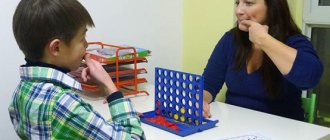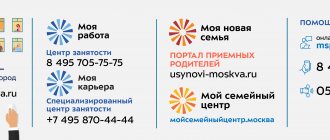Planning the work of a speech therapist teacher in a secondary school
This material discusses the problems that arise when a speech therapist teacher works with parents. The reasons for the occurrence of speech disorders, tasks, forms and principles of work of a speech therapist teacher with parents of speech pathologist children are also shown. I propose long-term planning of the work of a school teacher-speech therapist for the entire school year.
Causes of speech disorders in children
Every year the number of children with speech pathologies increases. During consultations, parents ask questions about the reasons for their occurrence. And the cause of speech disorders can be:
- Intrauterine pathology;
- Hereditary predisposition, genetic abnormalities;
- Adverse childbirth and its consequences;
- Diseases suffered by a child in the first years of life;
- The child has suffered stress or fear.
The increase in speech disorders is explained not only by medical factors, but also by the changed socio-cultural conditions in which children are growing up today.
One of the reasons for delays in speech development is insufficient communication between the child and his parents. Many parents, due to their busyness and fatigue, do not have the time or desire to communicate with their children. For many children, television becomes the main source of information. The silent state of family members in everyday life and constant watching of TV results in sad consequences for the child’s speech acquisition.
Peculiarities of parents' perception of speech problems in their children
There are parents who do not notice a speech disorder in their child and consider this to be a peculiarity of the child’s speech.
In other cases, parents hear speech errors, but do not attach any importance to them, they believe that it will “go away on its own,” “they will teach you at school,” etc., or they are of the opinion that one can live with a defect without any special problems. But such children, especially at school age, may be subject to ridicule from peers, which contributes to the formation of such negative character traits as touchiness, isolation, and negativism towards speech in general.
Speech therapists often experience difficulties in establishing contact with parents of pupils. There are parents who are not competent in matters of mental and speech development of children, so it is necessary to establish close cooperation. After all, the formation of a child’s speech occurs not only in special classes, but also in everyday life.
It is very important for a speech therapist to competently and consistently work with parents throughout the entire correctional and educational process. The main goal of the work is to achieve close interaction between the speech therapist and parents to achieve success in correctional work with children through various forms of joint work between the speech therapist and parents.
Tasks of a speech therapist working with parents
The main tasks of a speech therapist’s work with parents are:
- Inform parents about the state of the student’s speech, about the negative consequences of a speech disorder that is not corrected in a timely manner.
- Encourage them to seek speech therapy help.
- To equip parents in the process of conversations and consultations with the necessary knowledge and practical skills for home activities with their child.
Forms of work of a speech therapist with a family
There are stable forms of speech therapist work with families, which in pedagogy are considered traditional:
- individual conversations;
- consultations;
- general and group parent meetings;
- individual practical classes with children in the presence of parents;
- visual propaganda design by teachers in the form of stands, thematic exhibitions, etc.;
- survey;
- distribution of reminders and booklets for parents.
Principles of work of a speech therapist with parents
When working with parents, the speech therapist adheres to the following principles:
- The principle of cooperation between parents and speech therapist, parents and children. It must be emphasized that parents will seek the support and help of a specialist, listen to him and follow his advice only when the professional sees in the parents not “the object of his influence,” but an equal partner in the correctional process.
- The principle of student-centered pedagogy;
- The principle of involving parents in the correctional pedagogical process through examination and diagnosis of their children.
- The principle of taking into account interests or the principle of solving problems through interest, which means supporting parents’ interest in cooperation;
- The principle of leading activity. When working with parents, it is necessary to coordinate the actions of various specialists in the correctional activities.
- The principle of systematic work with the child. Ensure that homework is completed regularly.
Only close contact between a speech therapist and parents can help eliminate speech disorders in children, and therefore further successful schooling.
Planning the work of a speech therapist teacher in a secondary school
When working with parents, I make long-term planning for the entire school year.
Long-term planning of the work of a teacher-speech therapist at MBOU Secondary School No. 14 in Kyzyl with parents for the 2013-2014 academic year.
| Events | Date |
| Conducting individual interviews with parents of first-graders to collect anamnesis. | September 1-15 |
| Conducting individual conversations and consultations for parents from grades 2 to 4. | During a year |
| Parents attend group and individual speech therapy sessions. | During the year (at the request of parents) |
| Maintaining individual notebooks for children on correcting sound pronunciation, lexical and grammatical means of the language, etc. | During a year |
| Conducting consultations for parents whose children do not attend speech therapy group. | During a year |
| Recommendations for parents in the form of booklets, reminders and syllable tables. | During a year |
| Joint preparation of children for distance Olympiads in the Russian language. | During a year |
| Participation of parents in the work of PMPK. | May |
| Questionnaires for parents about the work of the school logo center. | May |
| Summing up the results of correctional work, recommendations for the summer period. | May |
| Publications on the website of the speech therapy office. | During a year |
| Online consultations for parents using the feedback forum on the website of the speech therapy office. | During a year |
| Conducting thematic parent meetings: | |
| Parent meeting in 1st grade on the topic: “The role of speech therapy in the educational process.” | First quarter |
| Parent meeting in 2nd grade on the topic: “What is dysgraphia?” | Second quarter |
| Parent meeting in grades 1-2 on the topic: “Kinesiological set of exercises that contribute to schoolchildren’s academic performance.” | During the year (at the request of senior managers) |
| Parent meeting in 3rd grade on the topic: “Dysgraphia and dyslexia.” | Third quarter |
| Parent meeting in grades 1-3 on the topic: “Speech breathing is the basis of life.” | During the year (at the request of class managers) |
| Parent meeting in 4 grades on the topic: “Prevention of written speech disorders” | Fourth quarter |
| Parent meeting in grades 1-4 on the topic: “Features of speech development in boys and girls.” | During the year (at the request of senior managers) |
| Meeting for parents of future first-graders. | May |
| Afanasyeva Olga Nikolaevna, teacher-speech therapist, Municipal Budgetary Educational Institution Secondary School No. 14, Kyzyl, Republic of Tyva |
- Work plan of a speech therapist teacher with a young specialist
- Work of a speech therapist teacher with parents of children with speech pathology in a secondary school
- Plan of organizational and pedagogical work of a speech therapist teacher in the middle group
- Forms of work of a teacher-speech therapist with parents of children-speech therapists in a school speech center
- Annual work plan for a secondary school speech therapist teacher
( 3 liked, average score: 4.67 out of 5)
Loading...
Work plan of a speech therapist for the school year.
State budgetary educational institution
Boksitovskaya special (correctional) general education boarding school of
the VII type
“AGREED” “APPROVED”
Deputy Director for Internal Affairs Acting Director of GBOU BSKOSH 7 types ________ A. N. Nurmukhametova ____________ A. N. Nurmukhametova
Annual work plan
teacher-speech therapist Galimova A.B.
for the 2015-2016 academic year
2015
The purpose of the work of a speech therapist at a school speech center
– providing speech therapy assistance to students with mental retardation who have deviations in the development of oral and written speech, which in the future can cause a violation of written speech, that is, the prevention of secondary disorders, as well as the correction of existing violations of written and oral speech.
Tasks:
— organization and conduct of diagnostic activities in order to timely identify students with speech pathology, correct qualification of existing defects in oral and written speech.
— organization of correctional work adequate to the defect, aimed at overcoming impairments in oral speech, writing and reading impairments of any form;
— organization of cooperation between a speech therapist teacher and primary school teachers and secondary level Russian language teachers in order to develop unity of requirements for students with impairments in the development of oral and written speech on the part of teachers and speech therapists.
— organization and conduct of comprehensive speech therapy work on the entire speech system: the psychological basis of speech, impressive and expressive speech.
| № | Event name | Content | Deadlines | ||
| Organizational work | |||||
| 1 | Preparing the classroom for the new school year. | Cosmetic renovation of the office. Wet cleaning in the office. Decoration of the speech therapist's office and corner. | until 01.08.2015. | ||
| 2 | Preliminary work with documentation. | Drawing up a work plan for a speech therapist teacher for the 2015-2016 academic year. Preparation of diagnostic material, speech card forms and protocols for initial speech therapy examination. | until 09/01/2015. | ||
| Diagnostic and analytical activities | |||||
| 3 | Primary and in-depth examination of children’s oral and written speech | Conducting a mass speech therapy examination of primary and secondary school students, an in-depth examination of the oral and written speech of children enrolled in a speech center. | 02.09.2015-15.09.2015 | ||
| 4 | Familiarization with medical examination data, collection of anamnesis of children enrolled in the logo center | Collection of anamnestic data and extracts from students’ medical records of information necessary for a speech therapist teacher | 02.09.2015-15.09.2015 | ||
| 5 | Monitoring children's oral and written speech | Carrying out monitoring, processing results and filling out relevant documentation. | 02.09.2015- 15.09.2015 14.01.2016-18.01.2016 16.05.2016-31.05.2016 | ||
| 6 | Preparation of documentation for a speech therapist at the beginning and end of the school year | Filling out speech cards, examination protocols of oral and written speech and signing the necessary documentation, completing a package of documents in accordance with the recommended list. Development of an adapted work program to overcome disorders of oral and written speech. Coordination of these programs at the methodological council of the educational institution. | 02.09.2015- 15.09.2015 14.01.2016 18.01.2016 15.05.2016- 30.05.2016 as well as during uch. of the year | ||
| 7 | Formation of groups and subgroups for correctional work | Formation of groups for correctional work in accordance with speech therapy diagnosis | 02.09.2015- 15.09.2015 | ||
| Corrective and developmental activities | |||||
| 8 | Conducting frontal classes in the form of groups according to the schedule of speech therapy classes | Correction of agrammatic dysgraphia, optical dysgraphia and dyslexia, acoustic dysgraphia, dysgraphia caused by disorders of language analysis and synthesis, dysorthography, OHP levels 3 and 4. | 15.09.2015–14.05.2016 | ||
| 9 | Conducting individual correctional classes according to the schedule of speech therapy classes | Correction of dyslalia, stuttering. | 15.09.2015–14.05.2016 | ||
| Advisory and methodological activities | |||||
| 10 | Consulting teachers on the results of examination of children’s oral and written speech | Results and results of the examination of student speech | 02.09.2015-15.09.2015 15.05.2016-30.05.2016 | ||
| 11 | Activities to promote speech therapy classes among teachers and parents, conduct group consultations (conversations, lectures, speeches at parent meetings, methodological associations, special seminars, consultations), conduct individual consultations for parents and teachers of educational institutions |
| According to the school work plan | ||
| 12 | Conducting a speech therapy week for teachers, educators and specialists of educational institutions. | Report, open individual and subgroup lessons, extracurricular educational activities, design of a speech newspaper, organization of a quiz. Topics of open classes on calendar and thematic planning of correctional and speech therapy classes. | October | ||
| 13 | Interaction with primary school teachers, middle-level Russian language teachers, educators and psychologists. | Mutual attendance at open classes and extracurricular activities | throughout the year according to the work plan of the Ministry of Defense | ||
| Relationship with OU specialists | |||||
| 14 | Diagnostics of various areas of activity, certain functions of the child | Together with an educational psychologist, conducting research on the sensory and cognitive spheres, fine motor skills in children. | From September 2 to 15 and from May 16 to 30. | ||
| 15 | Analysis of survey results, preparation of individual development programs | Mutual exchange of information in order to clarify and specify the conclusion, as well as to draw up individual development programs | September according to the school PMPK meeting plan | ||
| 16 | Introduction to the content of correctional education | Introduce the psychologist, primary school teachers, middle-level Russian language teachers and educators to the directions of correctional (speech therapy) work for the current year. | September according to the school PMPK meeting plan | ||
| 17 | Mutual attendance at correctional classes and educational activities | Attending correctional classes with psychologists, primary school teachers, Russian language teachers in grades 5-9, and open events for educators. | throughout the year according to the work plan of the Ministry of Defense | ||
| 18 | Preparation of documentation for PMPk and PMPK | Drawing up a speech therapy presentation if it is necessary to clarify or change the educational route for a child | throughout the year according to the work plan PMPk | ||
| 19 | Individual counseling | Weekly according to the work schedule of the speech therapist teacher | during the year | ||
| Working with parents | |||||
| 20 | Individual counseling, subgroup consultations, speaking at parent-teacher meetings | Introduction to the tasks of a school speech therapist. Report: “Providing speech therapy assistance to boarding school students of type 7.” Individual conversations on the topics: “Acquaintance with the results of a survey of students’ speech”; “Results of the work of a school speech therapist.” | |||
| Work to improve the equipment of the speech therapy room | |||||
| Submitting an application addressed to the director of the educational institution for the purchase of teaching aids and educational computer games |
No. 1 – 5 pcs. No. 2 – 5 pcs. No. 3 – 5 pcs.
| September October And during the year | |||
| 21 | Making handouts | on lexical topics in speech therapy classes “Vegetables”, “Fruits”, “Pets”, “Wild animals”, “Dishes”, “Clothing”, “Shoes”, “Hats”, “Transport”, “Toys”, “School supplies”, “Products” " etc. | during the holidays | ||
| Increasing professional competence | |||||
| 22 | Attending courses at BIRO, lectures, seminars, methodological associations | Taking a refresher course. Training. Passing the certification commission. | during the year | ||
| 23 | Working with scientific and journalistic literature | Studying articles from periodicals | during the year | ||
| 24 | Working on the Internet | Registration on speech therapy sites, studying resources and publishing your own work in them. Publication on the website of the GBOU BSKOSH school, type 7. | during the year | ||
| 25 | Conducting observations of the dynamics of speech disorders in speech therapy classes, the influence of certain methods on the speech development and correction of the child’s speech. | Introduce innovative and computer technologies, programs, non-traditional methods of speech correction into speech therapy work (aroma, Su-jok, music and hippotherapy), excursions: “Signs of autumn. Falling Leaves”, “Tuchkin’s Things”, “Winter Garden”, “Maritime Museum”, “Zoo” (SUE sanatorium “Yangan-tau”). Monitor their effectiveness in overcoming speech disorders in children with mental retardation. | during the year | ||
The work plan was drawn up by: _____________ teacher-speech therapist Galimova A.B.



